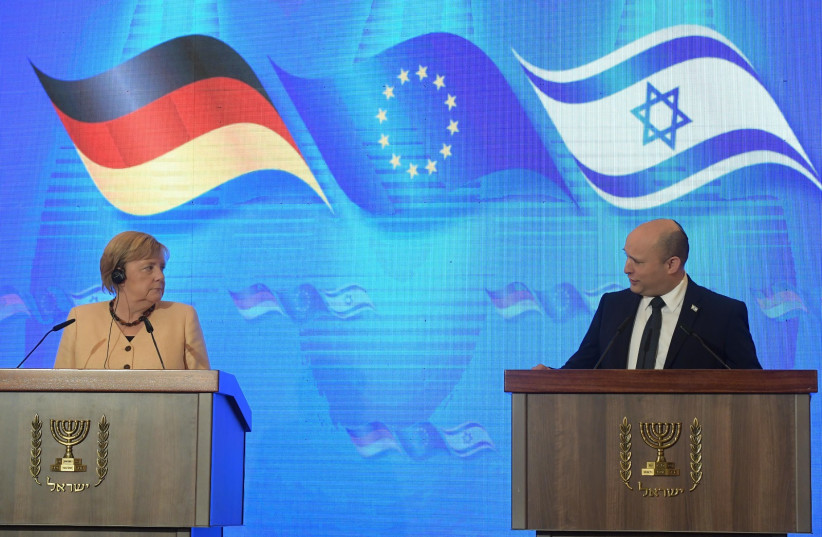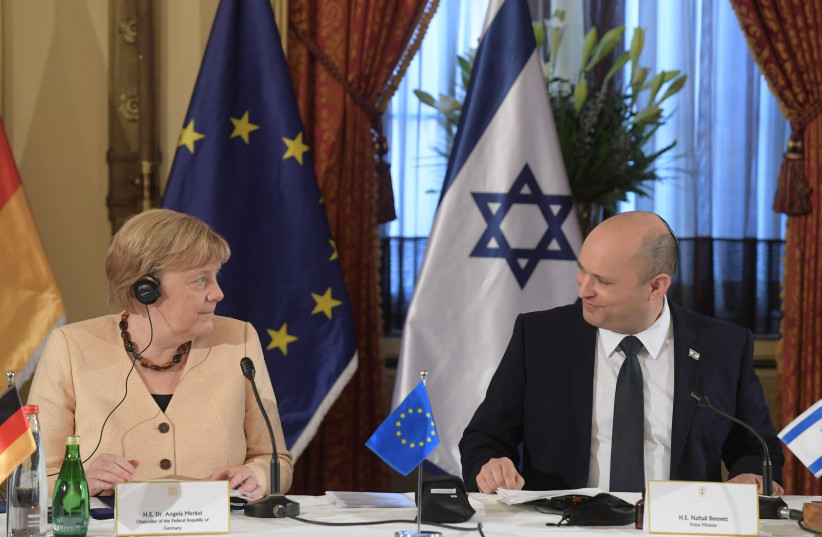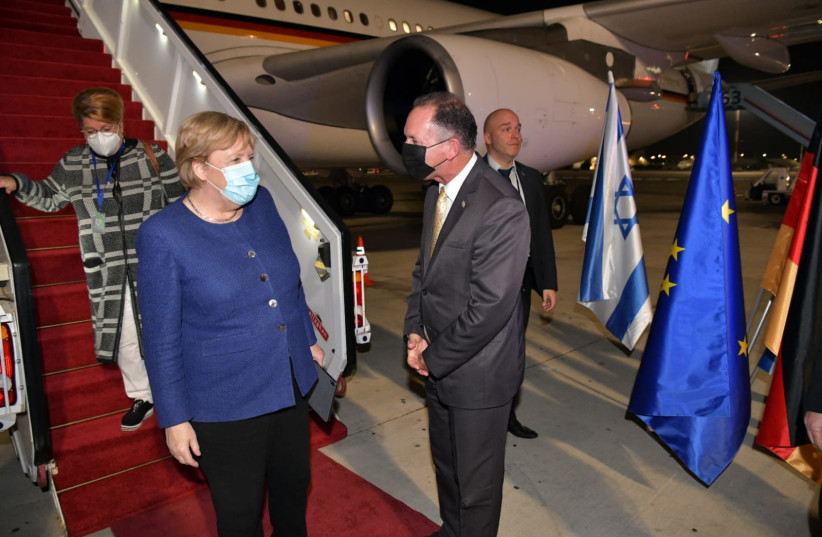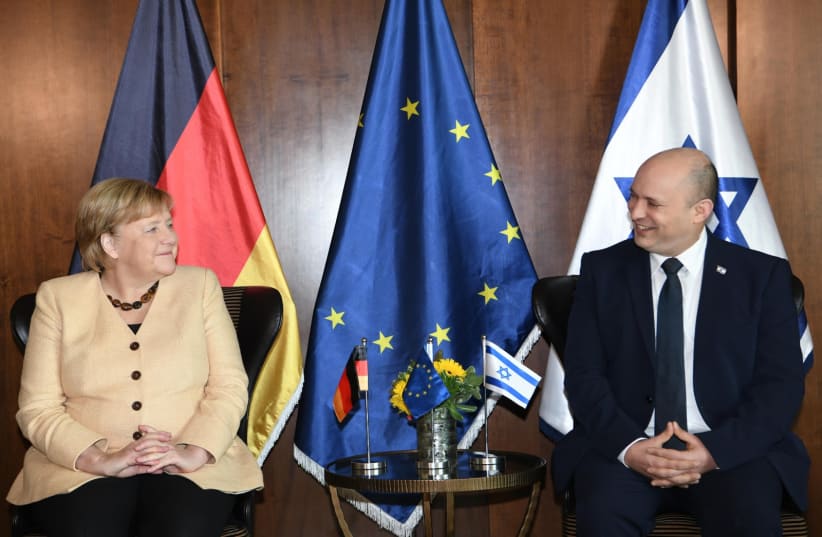Iran should rejoin negotiations to renew its deal with world powers to restrain its nuclear program, German Chancellor Angela Merkel said Sunday during a press conference with Prime Minister Naftali Bennett in Jerusalem.
“Iran’s uranium enrichment has made the topic into an urgent matter,” she said. “The nuclear agreement is not ideal, but we are now in a difficult situation because the Iranians are not entering talks and are continuing to enrich uranium.”
Iran left the talks in Vienna about a possible return to the 2015 nuclear deal in June and has been obfuscating whether it intends to return to negotiations ever since, while advancing its nuclear program farther than ever before.
“Without an agreement, we will be in a worse situation,” Merkel said.
“The message to Iran is unequivocal: Return to the negotiating table,” she said.
Prime Minister Naftali Bennett welcomed German Chancellor Angela Merkel today, at the King David Hotel in Jerusalem. PM Bennett: "We very much appreciate your ongoing friendship and commitment to the people of Israel." pic.twitter.com/mZtNNYx74d
— Prime Minister of Israel (@IsraeliPM) October 10, 2021
Bennett said the world “is waiting, and the Iranians are killing time, and the centrifuges are spinning.”
Israel would ensure with actions, not just words, that Iran will never have a nuclear weapon, because it would be an existential threat, he said.
“One can only imagine the degree of damage [Iran] would cause if the world knew that behind their bullying is a nuclear weapon,” Bennett said. “There is no point in trying to appease the Iranians; they interpret appeasement as weakness... This is a critical time, and Germany’s position is very important.”
Welcome to Israel, dear friend of Israel! pic.twitter.com/6TK947kgkg
— Naftali Bennett בנט (@naftalibennett) October 10, 2021
Merkel was in Israel for a visit marking the end of her 16 years in office. Her likely replacement is Social Democrats leader Olaf Scholz, pending coalition negotiations.
She held a one-on-one meeting with Bennett, joined a full cabinet meeting and met with President Isaac Herzog.
Merkel and Bennett also visited Yad Vashem together and had dinner together. She also plans to meet with Israeli hi-tech leaders and participate in a conference at the Institute for National Security Studies in Tel Aviv.
Asked about the Palestinians in the press conference, Merkel said a two-state solution is “important… We cannot remove it from the table.”

“Settlements get in the way of realizing a two-state solution,” she said.
Bennett said the “meaning of a Palestinians state is that there is a high likelihood of a terror state being established.”
Nevertheless, the Palestinians “are our neighbors,” he said. “They aren’t going anywhere, and we aren’t going anywhere.”
“I am a pragmatic person,” Bennett said. “We are taking action in the field to ease the situation for everyone in Judea and Samaria and in Gaza. One of the first things I did as prime minister was to offer the Palestinians coronavirus vaccines.”
Merkel reaffirmed Germany’s commitment to Israel’s security at the start of her meeting with Bennett.

“I want to use this opportunity to emphasize that the topic of Israel’s security will always be of central importance and a central topic of every German government,” she said.
“Compared with your government, a German coalition government seems a very simple matter,” Merkel quipped, saying she looked forward to meeting the members of Bennett’s “very diverse cabinet.”
Merkel said she had tried to strengthen the relationship between Israel and Germany together with all members of her government.
“It is not only matters that affect our past that play a part, but also our look to a common future,” she said. “However, it is fair to say that I continue to consider it a stroke of good fortune given to us by history that after the crimes against humanity of the Shoah, it has been possible to reset and to reestablish relations between Germany and Israel to the extent that we have done.”
“It would be a mistake to only base relations on the memory of the Holocaust,” she added.
Bennett opened his remarks by thanking Merkel for being a “true friend of the State of Israel.”
He quoted Merkel as saying her country was “not neutral” in the Middle East and supports Israel as the only liberal democracy in the region.

“That sentence is a moral stance that is so important to make heard, especially in Europe: We are not neutral,” Bennett said. “Not just because of the moral debt and the special relations between the two countries, because Israel is really, as I said in the UN, a lighthouse in a stormy sea. Whoever stays neutral in a conflict between Israel and countries like Iran and organizations like Hamas and Hezbollah lost his moral compass.
“You, chancellor, have served for years as the moral compass of the entire continent of Europe, drawing an uncompromising line of support for Israel.”
Bennett called on the ministers in his cabinet to advance cooperation with Germany in helping Holocaust survivors, increasing economic ties, especially in the areas of innovation and the environment and strengthening relations between members of the younger generation.
He said his cabinet has more women, nine, than any of its predecessors, adding that he thinks this is one of the reasons the members of his diverse coalition get along well.
Bennett and Merkel participated in a Holocaust memorial ceremony at Yad Vashem.
At the memorial, Bennett said he thinks “the most important lesson is the most obvious and simple of them all: The Jewish people’s place is here in the Land of Israel.”
Merkel’s visit to Israel was originally planned for August, but it was delayed due to the US evacuation from Afghanistan.
